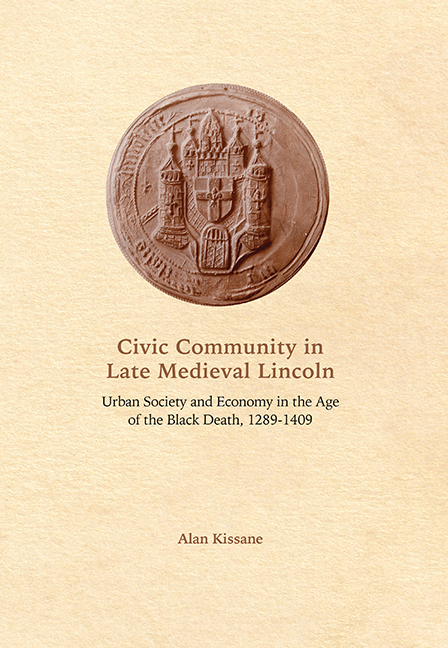 Civic Community in Late Medieval Lincoln
Civic Community in Late Medieval Lincoln Book contents
- Frontmatter
- Contents
- List of Illustrations
- Acknowledgements
- Abbreviations and Note on the Text
- Introduction
- 1 Urban Foundations: Occupational Structure
- 2 Lincoln as Entrepôt: Tolls, Trade and Credit
- 3 The Crown and the Fee Farm
- 4 The Growth of Civic Government
- 5 Fraternity, Orthodoxy and Communal Cooperation
- 6 Chantry Founders, Commemoration and the Rental Market
- Conclusion
- 1 Appendix 1: Occupational Sources and Data
- 2 Appendix 2: Lincoln Civic Officials, 1289-1409
- 3 Appendix 3: Lincoln Members of Parliament, c.1290-1410
- 4 Appendix 4: The Fraternal Year
- 5 Appendix 5: Perpetual Chantry Foundations
- Bibliography
- Index
5 - Fraternity, Orthodoxy and Communal Cooperation
Published online by Cambridge University Press: 27 April 2017
- Frontmatter
- Contents
- List of Illustrations
- Acknowledgements
- Abbreviations and Note on the Text
- Introduction
- 1 Urban Foundations: Occupational Structure
- 2 Lincoln as Entrepôt: Tolls, Trade and Credit
- 3 The Crown and the Fee Farm
- 4 The Growth of Civic Government
- 5 Fraternity, Orthodoxy and Communal Cooperation
- 6 Chantry Founders, Commemoration and the Rental Market
- Conclusion
- 1 Appendix 1: Occupational Sources and Data
- 2 Appendix 2: Lincoln Civic Officials, 1289-1409
- 3 Appendix 3: Lincoln Members of Parliament, c.1290-1410
- 4 Appendix 4: The Fraternal Year
- 5 Appendix 5: Perpetual Chantry Foundations
- Bibliography
- Index
Summary
By the end of the fourteenth century there were at least thirty-two religious and craft-based guilds in the city and its suburbs. Over 90 per cent of these institutions were established after 1275, which suggests that, despite an earlier legacy of guilds in medieval England, a specific need for them developed over the following 125 years. According to existing historiography such a need stemmed from three main factors: first, as individual fears over not being decently buried grew, guilds effectively performed the role of a ‘burial society’; second, the demographic upheaval of the Black Death prompted guilds to take the place of dislocated kinship structures; and third, guilds developed as a means to transcend the limitations of the parish; or, in other words, the changing needs of communities came to be better served through their involvement with voluntary associations as opposed to the often fixed and impermeable structures of the parish, a phenomenon influenced significantly by the growing involvement of the laity in local religious matters. However, when these theories are set beside the evidence for Lincoln they are not altogether satisfactory. In fact, it becomes necessary to pose a number of questions: why did only some parishes establish guilds and not others? What were the founders’ motivations and aims in establishing a guild? How should guilds established prior to the Black Death be considered – were they in fact different to those established after 1349? – and what was the significance of their foundation? Finally, when was the greatest growth of guild foundations in the city and how does this compare to other towns? It is the aim of this chapter to consider these questions. In so doing, it will analyse the impact of guilds upon the collective devotional and spiritual needs of their members, consider the importance of inter-guild cooperation in the city and detail how secular and religious ordinances recorded by guilds remain an important source not only for what they reveal about late fourteenth-century attitudes towards the crown, orthodoxy and organisation, but for local beliefs too.
Throughout this chapter particular focus will be placed on the growth and proliferation of guilds within the physical environment before 1389.
- Type
- Chapter
- Information
- Civic Community in Late Medieval LincolnUrban Society and Economy in the Age of the Black Death, 1289-1409, pp. 156 - 198Publisher: Boydell & BrewerPrint publication year: 2017


